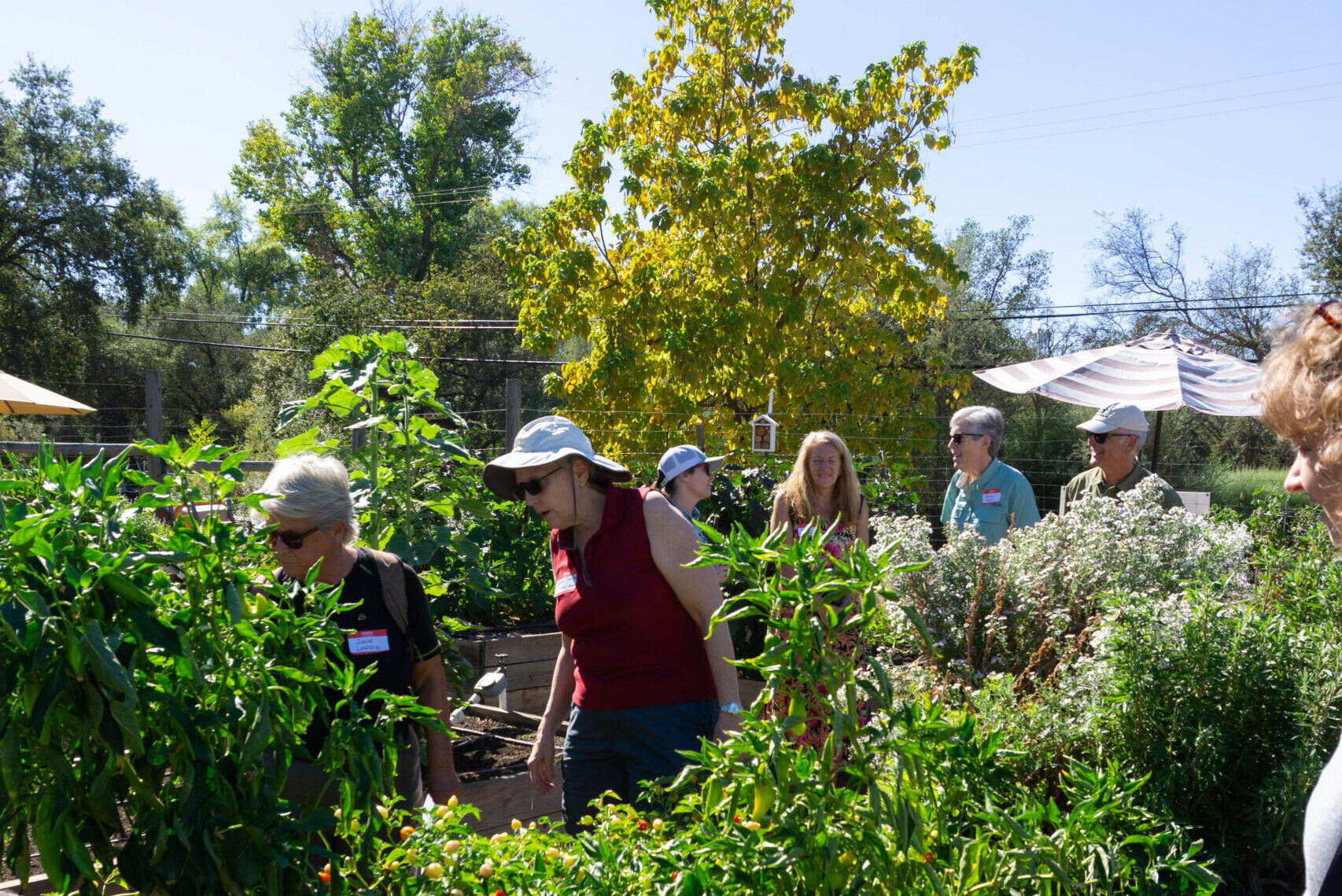
On October 11, 2024, over 18 community garden leaders from seven distinct community gardens across Placer County came together for the second Placer County Community Garden Leader’s Tour, journeying through gardens that act as more than food sources—they are community hubs of resilience, cultural heritage, and stewardship.
The Tour explored three vibrant community gardens in Loomis and Lincoln, California: the Loomis First United Methodist Church Community Garden, Lincoln Community Gardens, and the St. James Community Garden in Lincoln. Each site featured its unique organizational structure, purpose, and culture, providing participants with a broad array of perspectives on community gardening. This experience, supported by the National Association of Conservation Districts (NACD) through its Urban & Community grant program awarded to Placer RCD in 2023, underscored the potential of community gardens to act as vital anchors in today’s food system and society.
Community Gardens: Catalysts for Resilience, Kinship, and Knowledge
Community gardens are unique spaces, often operating at the margins of traditional food systems. Relying on collective support and shared resources, they yield far more than food; they cultivate kinship, cultural expression, and innovative problem-solving. These characteristics make community gardens resilient yet vulnerable, highlighting the critical importance of community initiatives like the Leader’s Tour.
A Layered Approach to Learning: Integrating AQAL and Kolb’s Experiential Frameworks
The Tour’s layered structure aligns well with Integral Theory’s All Quadrants, All Levels (AQAL) framework. Viewed through AQAL’s lens, community gardens engage individual and collective aspects, influencing inner personal growth, fostering sustainable practices, strengthening communal values, and shaping societal structures. The Leader’s Tour offers a window to the layers of meaning and experience a community garden provides as a vital ecosystem where many of its purposes are intricately connected.
The Tour is also structured through a modified version of Kolb’s Experiential Learning Theory, emphasizing three key stages: Framing, Experience, and Reflection. At each garden, participants learned about the purpose and structure of each garden, with time at the end of the Tour to reflect on what they observed and take back with them to their respective gardens. This reflective process encourages participants to absorb insights more profoundly and practically, solidifying new ideas for their gardens’ growth.
The multi-faceted and multi-leveled uses and purposes of a community garden make the Community Garden Leaders Tour rich in meaning and purpose and is illustrated in the graphic below:

Embarking on a Day of Exploration and Connection
The day began at Loomis United Methodist Church Community Garden, where introductions unfolded in a welcoming circle. Participants shared their garden affiliations and thoughts or feelings for the day. Andrew Justus-Fritz, the Community and Conservation Director with Placer RCD, framed the day by emphasizing the gardens’ roles as spaces of kinship, resilience, and communal support and the historical and cultural significance of sharing as gardeners in a space like this. From there, participants toured the garden led by garden manager Patrick Aiello, discovering a landscape interwoven with religious, cultural, and community meaning.

Loomis UMC stands out for its composting operation, extensive raised beds, pollinator plants, cultural elements that point toward its Japanese origins and influence, and a strong network of support from church members and volunteers. Food from this garden is donated to the pantry located on the church premises, reinforcing its role in food security and community care. The next stop was Lincoln Community Gardens, where garden manager Pamela Abad shared her experience managing a community garden on a tenuous landholding. Here, participants glimpsed a shared governance and responsibility model that empowers tenants to care for the space. Placer RCD’s Andrew Justus-Fritz also introduced participants to cover crops, underscoring soil health and conservation with a demonstration.

The final stop at St. James Community Garden highlighted a culturally rich environment where gardeners from diverse backgrounds have collaborated to create a “cultural safe space.” Garden manager Julie Lowrie showcased an array of culturally significant plants, including Pápalo, Huazontle, and Pepicha, emphasizing how each plant plays a role in honoring the cultural heritage of the community’s members. Participants sampled these plants, gaining a taste of the cultural knowledge embedded in the garden’s practices. St. James Community Garden is also pioneering water conservation efforts through a nascent water catchment system, a vital innovation for the community’s future sustainability.





Reflections on Learning, Culture, and Community Resilience
As the day concluded, participants gathered to reflect on the insights gained from each site. Several key reflections emerged:
- Culture is Essential: Many participants noted cultural heritage’s powerful role in each garden’s unique environment. The inclusion of culturally significant plants and community-specific governance models underscored the gardens’ roles as “place-based” community hubs, where cultural identity is honored and preserved.
- Strengthening Networks: Participants expressed a desire to continue these gatherings and foster inter-garden connections, indicating that the Tour has kindled an interest in ongoing collaboration beyond Placer RCD’s direct leadership.
- Conservation and Soil Health: Participants were eager to implement cover crops, recognizing them as foundational in sustainable gardening and soil conservation.
In Summary
The 2024 Placer County Community Garden Leader’s Tour provided community garden leaders with a deeply enriching day of learning, connection, and inspiration. Supported by NACD’s Urban & Community grant, the Tour allowed participants to visit three unique community gardens in Loomis and Lincoln, each with its own identity, structure, and purpose. Through the Tour’s AQAL-informed lens and the experiential approach of Kolb’s learning stages, leaders could learn and reflect on the intricate ways community gardens fulfill the needs of the individuals and communities they serve.
By facilitating kinship, providing conservation education, and recognizing the cultural significance embedded in these spaces, the Tour fostered a deeper understanding of the value and complexity of community gardens. Each garden’s distinct approach highlights an ecosystem of care that extends beyond food production, embracing cultural heritage, conservation, and collective resilience.
